It’s the most fun I think any of us had playing basketball. – Alex Jensen
SALT LAKE CITY — While you might say it was 20 years ago today, Sergeant Pepper taught the band to play, you can also say it was 20 years ago that the University of Utah basketball team came to play, embarking on its own Magical Mystery Tour that took the Utes all the way to the NCAA championship game.
OK, excuse the Beatles’ references, but that NCAA run in March 1998 indeed was a magical time for the Utah basketball team.
It began with a regular season that saw the Utes win 25 games and lose only two. It included a disheartening defeat in their first game of the WAC Tournament, which according to the players turned out to be the “best thing” that could have happened to the Utes. Then came the ride through the NCAA Tournament with close wins over lower-seeded teams and shocking wins over two No. 1 seeds.
Finally came the disappointing defeat in the final to the Utes’ old nemesis, Kentucky, when the Utes simply ran out of gas and saw their championship dreams disappear into the rafters of the Alamodome in San Antonio.
In a different era with far fewer teams and games to win, Utah had won the 1944 NCAA championship. But the three-week, six-game journey by the Runnin’ Utes was the best NCAA performance by Utah or any school from the Beehive State.
To a man, Ute players said it was a special group that may not have been the most talented, but came together under their mercurial coach Rick Majerus.
“Just the group of guys we had, it was a good fit,” said Alex Jensen. “It’s hard to get that any more. It’s the most fun I think any of us had playing basketball.”
Michael Doleac said it was the highlight of his basketball career, topping the NBA championship he won with the Miami Heat.
“The thing that stands out is the guys worked so hard with one common goal,” said David Jackson, a reserve guard. “I’ve never been around a group of guys that close. It was really a tight-knit group. It was really a lot of fun.”
“It was pretty magical,” said Hanno Mottola.
Early success
Even though the Utes were coming off an Elite Eight appearance, not much was expected in the 1997-98 season. The Utes had lost All-American Keith Van Horn to the NBA and weren’t even picked to win the Western Athletic Conference after three straight championships.
“It’s a little different out here without No. 44,” said Majerus before the season, referring to Van Horn. “No one really seems to understand this is not a veteran team. We have three guys who have had unbelievable success and 10 guys who haven’t had any success.”
As usual in the Majerus regime, the Utes didn’t have a tough preseason schedule with the likes of Azusa Pacific, Loyola Marymount, Cal State Fullerton and UC Irvine on the slate, games the Utes won by an average of 31 points.
There were the usual in-state opponents, Utah State, Weber State and Southern Utah, which the Utes dispatched by margins of 16, 15 and 18 points, respectively.
The Utes did have a few challenges, most notably a game at Wake Forest in late December, which the Utes won 62-53. There were also a couple of neutral-court contests as Utah beat Providence 64-58 in Chicago and Oregon State 69-61 in Portland.
For the league season, the Utes were playing in the third year of the unwieldy 16-school WAC, which introduced a new format that year. Instead of the pod system of the previous two seasons, each team played home-and-home games from their own division with two games against a school from the other division, which didn’t count in the regular-season standings.
Utah’s non-division games were against Rice, an eventual 6-22 team, which the Utes beat 73-65 in early January to improve their record to 12-0. That vaulted them to No. 3 in the nation behind North Carolina and Duke. Wins against BYU, Colorado State, Wyoming, Air Force, UNLV and UTEP followed, setting up a huge game against No. 14 New Mexico, which had been picked to win the WAC at the start of the season, in a nationally televised game.
The Albuquerque mugging
The Utes and Lobos had played several epic games over the years, but the Feb. 1 showdown in Albuquerque may have been the biggest of all, in front of a frenzied sold-out crowd at The Pit as well as a national audience on ABC-TV.
The Utes, who shot 62 percent from the field that day, dominated the first 37 minutes behind Andre Miller, who finished the night with 24 points on 10-of-12 shooting with seven assists and five rebounds. But in the final three minutes, the Utes were outscored an astounding 19-5 as the Lobos turned up the defensive pressure and the Utes missed crucial free throws.
Most Ute fans will never forget how Miller was “mugged” twice in the backcourt in the final two minutes, resulting in turnovers for Lobo baskets.

University of Utah's Andre Miller, left, and head coach Rick Majerus watch from the sideline of the 1998 NCAA Championship basketball game in San Antonio against Kentucky. | Ravell Call, Deseret News
The first happened with 1:35 left and the Utes leading 71-65 when Miller was hit in the eye by Royce Olney, lost the ball and the Lobos scored at the other end. Then with 1:03 left, Miller was hit in the back of the head by Olney with no foul called and Olney sank a 3-pointer to close the gap to one.
During a timeout, Miller laid on the floor for two minutes, while Majerus railed at the officials. Both Drew Hansen and Jensen missed free throws in the final 46 seconds and the Lobos won the game 77-74 on Olney’s 3-point basket with 4.7 seconds left.
Miller rarely got animated during his career, but he did after the game when asked if he was fouled.
“Yeah, you saw it,” he said. “I got hit in the back of the head. I thought I was fouled, but you can’t do anything about the referees.”
Majerus who was livid at the no-calls, held his tongue after the game, saying, “I don’t know, I’m not a referee.”
Doleac was more direct. “Andre doesn’t turn the ball over. It’s hard for me to believe he dropped it twice in a row,” he said.
The Utes' only other regular-season loss came 11 days later in Laramie when the Utes squandered an 11-point second-half lead to Wyoming as Miller had six turnovers and Doleac, the best free-throw shooter in the WAC, missed three straight in the final minutes as the Utes fell 61-56.
Blessing in disguise
After winning the WAC’s Mountain Division at 12-2 and entering the conference tournament as the No. 1 seed, as well as being the No. 5-ranked team in the country, Utah wasn’t happy about having to play UNLV in the quarterfinals of the WAC Tournament on the Rebels’ home court.
The Utes had beaten UNLV twice by double digits during the regular season and hoped to avoid a third game against them, but the Rebels defeated Hawaii two nights earlier in the first round.
That didn’t make Majerus happy, as the Ute coach said, “This is like playing a road game.”
“We always have to do it the hard way,” added Hansen.
The Utes had a first-round bye and came out like they would cruise to another victory, getting ahead by 10 points late in the first half, only to see the Rebels pull to within three at the break. Utah fell behind in the second half, but went ahead on a Hansen 3-pointer and added a couple Doleac free throws to take a 51-48 lead with 3:51 left.
Those would turn out to be the last points the Utes would score.
Miller missed three shots in the final minute and the Utes lost 54-51. They shot just 27.6 percent from the field in the second half and their 33.6 overall percentage was their lowest of the season. They came in as the nation’s leading rebounding team, but were outboarded 37-25.
The game ended just before midnight and the next day the team had to take a bus home from Las Vegas because there were supposedly no flights out of Las Vegas on Friday. That’s what coach Majerus said at the time, but Britton Johnsen and Jensen didn't believe it.
“We took a lashing at the WAC Tournament and he made us ride a bus home while he flew home,” said Johnsen. “(Majerus) specifically canceled our flight, to set the tone and tell us he was pissed at us.”
“No question he could have gotten us a flight,” said Jensen. “It was snowing and it was literally an eight- or nine-hour drive. It took forever.”
Jensen said the first two or three hours, the despondent Utes didn’t say a thing. But by the end of the long ride home “we were playing cards and laughing and joking like college kids.” Jensen said when they returned to practice on the weekend, Majerus didn’t rehash the bad loss and got the team back to business.
“It actually worked out great because we had time to be together on the bus and (Majerus) didn’t come,” said Jensen. “It was the best thing in the world.”
Johnsen agreed, saying, “It was a tough game playing UNLV on their court in front of their fans, which is always a little unfair. But that loss was by far the best thing that happened to us that year to get us to the championship.”
First three
Following the quarterfinal loss in the WAC Tournament, Majerus said he had been too lax with his team and he drove them hard before the NCAA opener. He called his practices on Saturday and Monday after the Vegas defeat “great” and added he “couldn’t be more pleased.”
The previous two years, the Utes had practiced a little bit for possible second-round games, but after the upset to UNLV, Majerus claimed he hadn’t “given a fleeting thought” to either of the Utes’ possible second-round opponents. He also told his players not to pack clothes for a second day. “They can wear the same clothes if they have to. We’re just trying to win Game One.”
Still the coach was confident. “We have to play our best ball and I believe we will,” he said.
Turned out he was right as the Utes played their best basketball over the next three weeks.
On Selection Sunday, despite the UNLV loss, Utah was given the No. 3 seed in the West and was assigned to Boise, which was ideal for the Utes and their fans because of the easy drive up to Idaho.
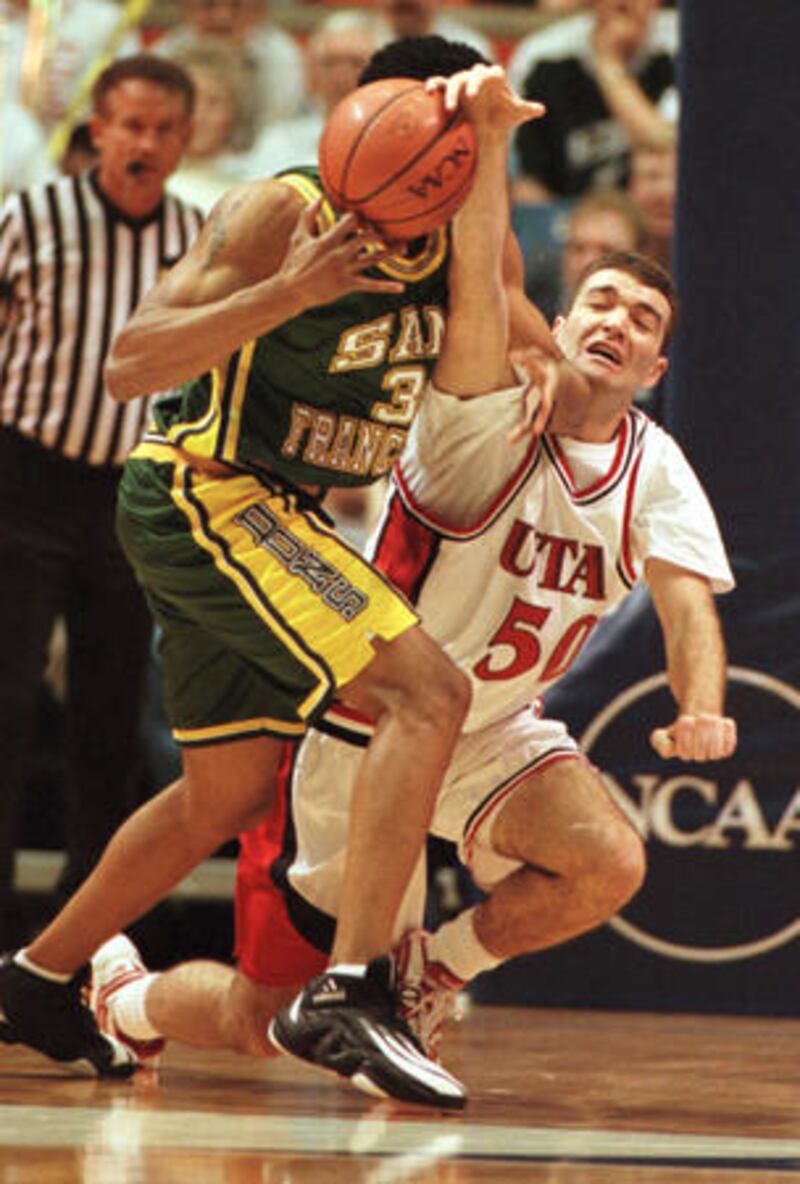
Alex Jensen battles for the ball with Zerrick Campbell. | Jeff Allred, Deseret News
The Utes dispatched a small San Francisco team by 17 points before taking on an athletic Arkansas team, coached by Nolan Richardson.
Before the game, Utah’s Majerus and Arkansas’ Richardson each took turns extolling their opponent and downplaying their own team’s chances.
Majerus said Arkansas was “much more athletic, much quicker and much deeper” than his own team.
Richardson responded by saying, “My man Majerus is the best in the country at sandbagging. They’re the biggest team in America. You’re talking David and Goliath. We’re going to need more than a slingshot. I wish I knew what to do. I’m just going to pray — that’s all I can do.”
Miller turned out to have his best game as a Ute up to that point, scoring 28 points, including 14 in the final seven minutes as he continually broke the Razorbacks’ press with his drives up the court.
Then it was on to Anaheim, California, where the Utes matched up against West Virginia, the No. 10 seed that had knocked off the West’s No. 2 seed, Cincinnati, on a last-second shot in the previous round. The game turned out to be Utah’s closest call of its five NCAA wins, as the Utes won by three when a last-second shot by the Mountaineers bounced out.
“I’m so proud of our guys,” said Majerus. “We hung tough and got a bounce here or there. This was about as hard a fought game as we’ve played all year. But now we’re in the Elite Eight and damn proud of it.”
66 and the triple-double
They called it the 66 defense.
It’s better explained as a triangle-and-two defense where three defenders set up in a triangle zone near the basket while the other two defenders chase two players in a man-to-man defense.
That’s what the Utes cooked up in their Elite Eight game against defending national champion and No. 1 West seed Arizona, and it allowed the Utes to roll to a wholly unexpected 76-51 victory.
Not many folks had given Utah much chance against the Wildcats, who had their top six players back from the year before, including future NBA lottery picks Michael Dickerson, Mike Bibby and Jason Terry. The Wildcats had won their first two NCAA games by 39 and 33 points, respectively, before beating Maryland by eight in their Sweet 16 matchup. Meanwhile, Utah had struggled to squeak by its two previous opponents by a total of nine points.
However, the Utes were surprisingly optimistic going into the game.
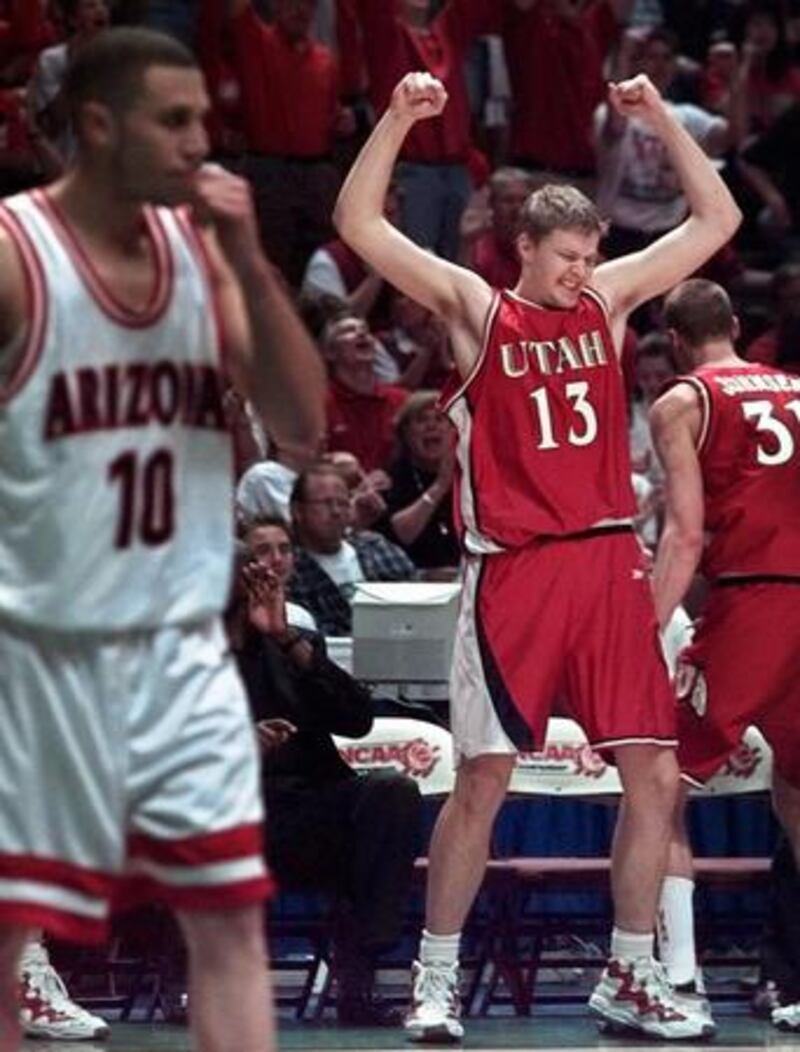
Utah's Hanno Mottola celebrates the victory as the final seconds run out in Utah's upset over Arizona in the NCAA West Regional final at the Arrowhead Pond in Anaheim, California, Saturday, March 21, 1998. Utah defeated Arizona 76-51. | Mark J. Terrill, Associated Press
At the Friday press conference, Majerus had talked about “a little wrinkle” the Utes had planned that his players were excited about.
It was the 66 defense.
Assistant coach Jeff Judkins said there were a couple of other things that made a difference besides the 66.
“We had played those guys the year before in Anaheim and it was a really close game (69-61 for Arizona), so we weren’t nervous and weren’t in awe of them,” he said. “Mike Bibby was guarding Andre Miller, and right at the first of the game he was picking him up full court and right about midcourt Doleac set a pick and just clocked him and knocked Bibby to the ground. That set the tone.”
So how did the 66 defense get cooked up? Judkins remembers clearly.
“It was really funny, (Majerus) went out to dinner (after Thursday’s game) with all his buddies and all the other coaches were sitting in the room, watching film and writing the board up. Donnie, me and Brock (Brunkhorst) said, ‘You know we ought to triangle-and-two these guys.’ We were talking and said, ‘We need to bring this up to coach when he comes in.’
“So when he walked in, we said, ‘Coach, we think we should run a triangle-and-two’ and he goes, ‘That’s exactly what I’ve been thinking the whole night and I think we can do it.’ So it was interesting because we were all on the same page, which is kind of surprising. The one thing I loved about coach Majerus is he listened to what you said because you spent so much time working on it.”
The Wildcats were totally befuddled by the triangle-and-two as their three top scorers, Bibby, Dickerson and Miles Simon were held to an abysmal 6-of-36 shooting.
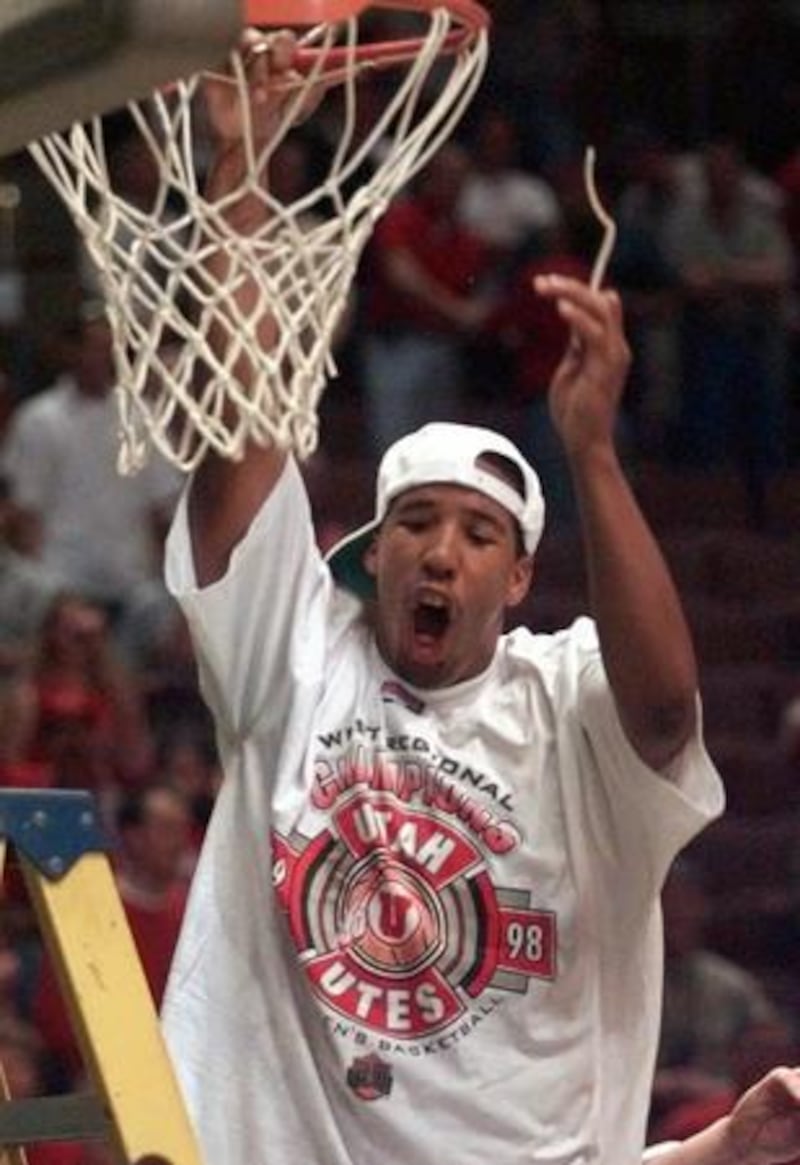
Utah's Andre Miller cuts the net after the Utes upset Arizona in the NCAA West Regional final at the Arrowhead Pond in Anaheim, California, Saturday, March 21, 1998. Miller scored a team-high 18 points in Utah's 76-51 win. | Mark J. Terrill, Associated Press
While the 66 was a large part of the Utes' upset, the brilliant play of Miller was just as big. He had perhaps the best overall game in Utah basketball history with his triple-double, scoring 18 points, grabbing 14 rebounds and handing out 13 assists.
Ask Miller now, and he says his biggest memory of the game was the Utes’ preparation with the triangle-and-two, which gave him the opportunity to do what he does best.
“My spot in the triangle gave me the opportunity to drift around and my job was just to go get the rebound, communicate and to help everybody else,” he said. “I got a lot of rest on defense and was able to push the ball, make passes and get rebounds.”
Miller also said the Utes were confident heading into the game and not intimidated by the talented Wildcats.
“We had played that team the year before with (Keith) Van Horn and we knew we could play with them,” Miller said. “We knew they didn’t take us for granted, but we were prepared. We were in a zone at that point and just kept on rolling.”
Shattering the dream
Following the unexpected drubbing of Arizona, it was off to San Antonio for the Final Four, where the Utes were matched up with the No. 1 team in the country, North Carolina.
The 33-4 Tar Heels were on a mission after losing to Arizona in the national semifinals a year earlier in Indianapolis. They had pictures of the Alamodome taped to their lockers all season, and they convinced their coach to let them go to San Antonio earlier in the week than planned to get ready.
North Carolina featured the best player in the country in Antawn Jamison, who won the John R. Wooden Award that year, as well as future NBA star Vince Carter and guard Shammond Williams.
If the Utes were intimidated, they didn’t show it.
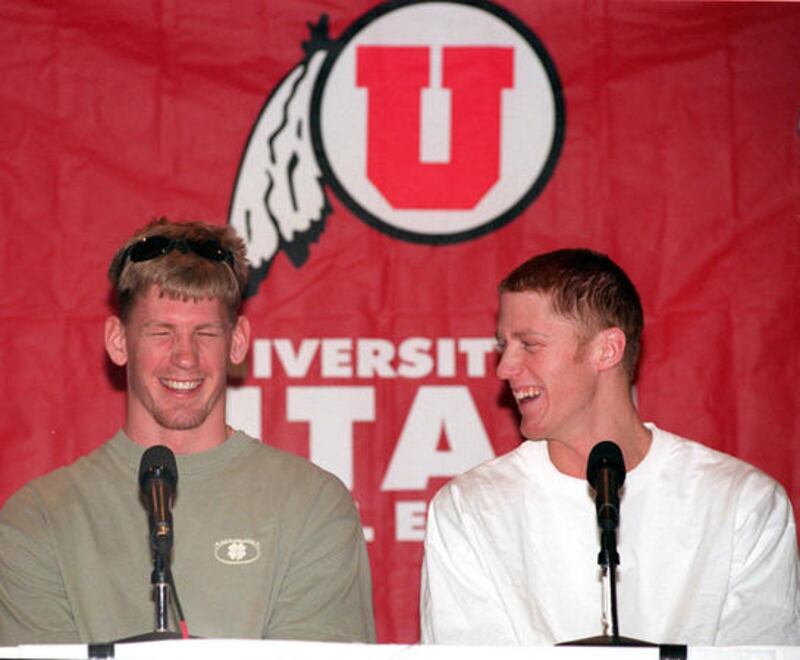
University of Utah's Michael Doleac (left) and Britton Johnsen talk with the media at a news conference Tuesday, March 24, 1998, in Salt Lake City. The Utes were on their way to San Antonio for the 1998 NCAA Division I Men's Basketball Tournament. | Chuck Wing, Deseret News
“They are players just like we are,” said Doleac. “We might as well win it.”
“We’re not going to lay down and let North Carolina run over us,” added Miller. “We made it this far, why not go all the way and win it.”
Actually there was a little intimidation as Miller recently admitted.
“Seeing those guys in the layup line before the game. … Vince Carter was jumping all over the place, one of the most athletic persons I’ve seen in my life. But we had to wipe that away and just go out there and play.”
Although the Utes lost a couple of nights later, the win over North Carolina was the highlight of the year for some Utes.
Trace Caton, a freshman forward, says his best memory of the NCAA run was playing the last six minutes of the first half and going head-to-head with Jamison.
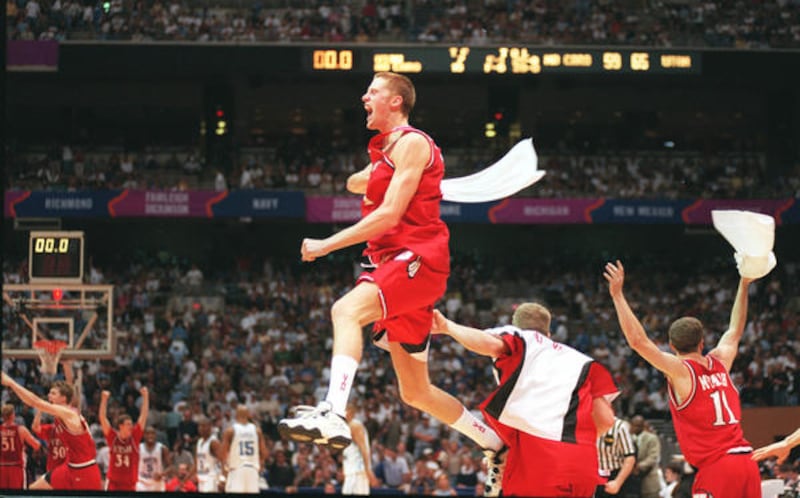
Britton Johnsen celebrates with his teammates following the Utes' semifinal win over North Carolina in the Final Four 1998 NCAA Division I Men's Basketball Tournament in San Antonio Saturday March 29, 1998. | Ravell Call, Deseret News
“It was something so unique for us, the fact that we went there and were pretty much the best team in that Final Four,” said Johnsen. “I mean let’s be honest, we should have beaten Kentucky. I think the best thing was beating North Carolina and knowing we were the best team in the Final Four.”
Carter never forgot the loss as it was his last chance for an NCAA title after losing in the semis the year before. He declared for the NBA draft that spring.
“Every time we’d play (in the NBA) he would remind me, ‘You ended my career at North Carolina,’” said Miller.
Carter, who is still playing in the NBA at age 41, confirmed that recently when the Utah Jazz played his Sacramento Kings.
“Every time I see (Miller), I tell him I’ll never forget it.” Carter said. “It’s petty, I know that. But we felt we were good enough to win it that year. They were definitely good enough to be in the Final Four. We thought we were going to win for sure, but they shattered our dreams.”
Sunday distraction
The last thing the Utes needed entering Monday night’s championship game against Kentucky was a distraction, and they got a big one when Utah’s Johnsen was accused of using a racial slur against North Carolina center Makhtar Ndiaye during Utah’s semifinal win.
Ndiaye had experienced a frustrating game, not only being on the losing side, but going scoreless and fouling out. He had even spit on Johnsen and when asked why, told a San Antonio reporter it was because Johnsen had used the N-word against him, not once, but throughout the game.
So here the Utes were, in the national championship game, and they had to defend a young freshman against charges of racism.
For the 18-year-old Johnsen, it was an extremely troubling experience.
“I was sick,” he said recently. “Here’s the team ready to play for the national championship and I’m worried everybody thought I was racist. I didn’t even want to go out in public.”
Majerus summoned Johnsen to his hotel room that morning and was furious.
“After seeing everything in the papers, he ripped me from head to toe and said he was sending me home,” recalls Johnsen. “I broke into tears and said, ‘Coach, I did NOT do that’ and told him ‘no way in a million years would I call him that.’”
After a few minutes, Majerus came around.
“All of a sudden Majerus changed from being pissed at me to being on my side and he said, ‘OK we’re going to take care of this.’ Next thing I know he’s making phone calls and taking care of the whole thing. We did a big press conference, and he said, ‘I know this kid, I know his family, I know his values and if he said it, I’ll resign today.’ He just squashed it.”
Ndiaye later retracted his comments, putting the controversy to rest.
Johnsen said the incident turned out to have a happy ending.
“People ask me all the time if I’m mad about that situation, that he did that. But (Ndiaye) actually did something pretty admirable. He wrote me a letter expressing an apology. I still have the letter to this day.
“So it actually becomes a pretty phenomenal story of somebody who could have just kept with his lie, which most people might do, but he retracted it. I haven’t seen the guy since, but if I did, I’d give him a big bro-hug and say ‘Dude, I appreciate that you did that.’ Because in the heat of the moment, we all do stupid things. It was a horrible experience, but a memorable experience because it got worked out.”
Out of gas
The Utes started the championship game against Kentucky like they had in their previous NCAA tourney games, building a first-half lead with a 17-8 run en route to a 41-31 halftime lead.
The 5,000 or so Ute fans among the Alamodome crowd of 40,509 were rockin’ while the large contingent of opposing fans were bluer than their Kentucky attire.
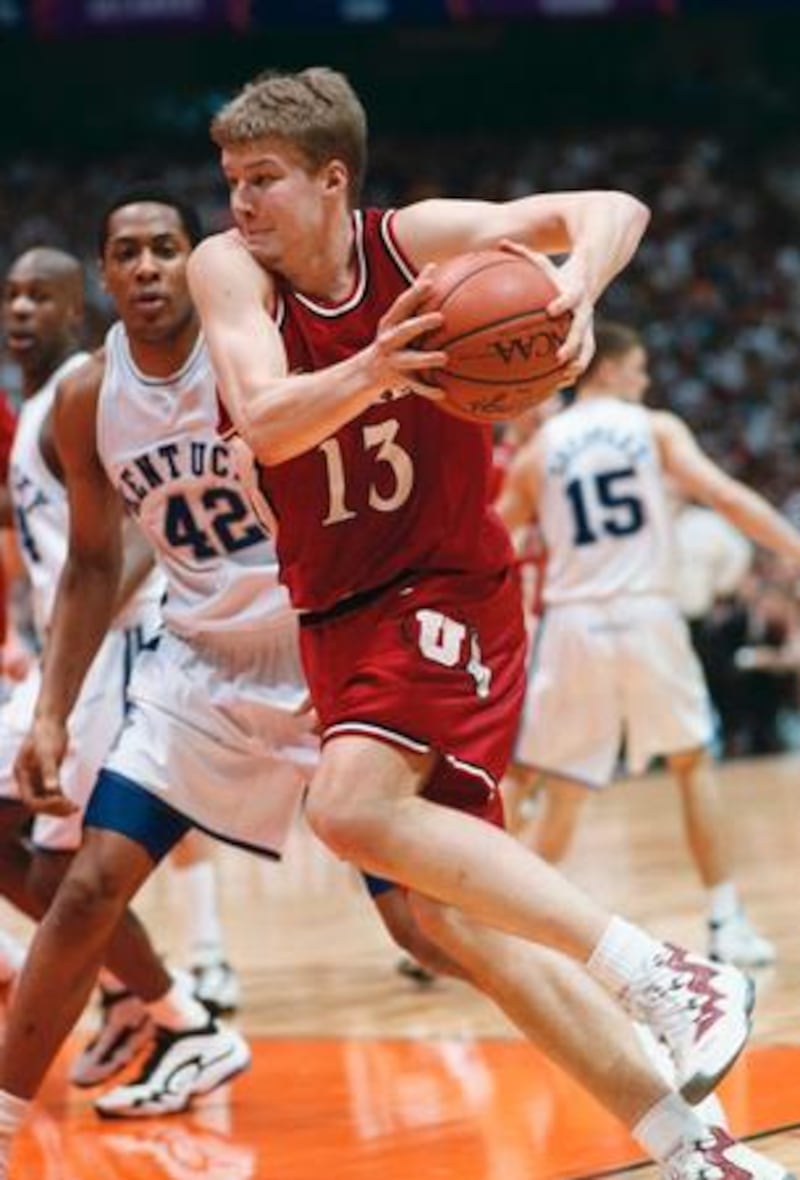
Captions text here | Tom Smart, Deseret News
The Utes were just 20 minutes away from a national championship and they could almost taste it. They held halftime leads of 13, 6, 9, 9 and 13 in their previous five NCAA games and came out on top each time.
But they were playing a Kentucky team that had overcome second-half deficits 11 times during the season, including a 17-point margin against Duke in their Elite Eight game and a 10-point deficit in the overtime win over Stanford in the Final Four.
The lead melted to nothing with 7:58 left and the Wildcats tied the score at 58. But the Utes settled down and scored six straight points to go up again, only to see Kentucky score seven straight to take the lead for good.
“We just missed a lot of easy shots because I think we were tired,” Judkins said. “Donny (Daniels) and myself kept telling coach we need to sub, we need to get Doleac out for a minute and give him a blow. But he didn’t want to do it. He just felt like he needed him in there. I think what happened is we lost a little bit of edge inside because Doleac was tired.”
Johnsen was the only reserve to score, with seven points, as the other three off the bench, Jordie McTavish, Jackson and Caton went scoreless. That trio played just a combined 18 minutes, their lowest combined output of the season. Four Ute starters played at least 32 minutes, led by Miller’s 37, while Mottola played 28.
“Majerus kept the starting five in, he didn’t sub,” recalls Johnsen. “In the national championship game, he wanted to go with his horses. To his credit, I would have probably done the same thing. That was the five that got us there.”
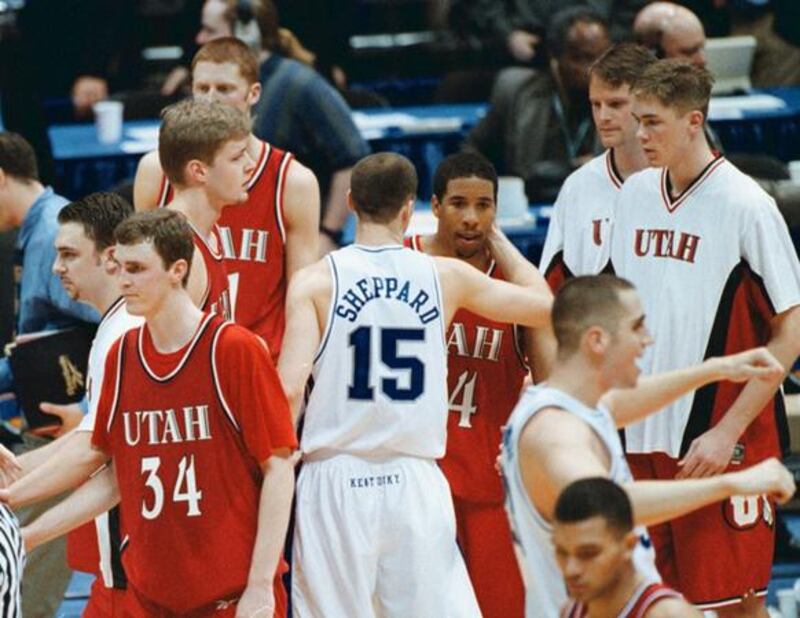
Kentucky's Jeff Sheppard hugs University of Utah's Andre Miller after the 1998 NCAA Championship basketball game in San Antonio March 30, 1998. | Tom Smart, Deseret News
McTavish agrees the team ran out of gas, but doesn’t argue with the decision to stay with the starters.
“The starters were pretty good and it was kind of hard not to run with those guys,” he said.
Jensen often sees Jamaal Magloire, one of the Kentucky centers from the ’98 team, who now works for the Toronto Raptors, and they talk about that final game.
“I always remember Doleac played about 38 minutes (actually 34) and (Kentucky centers) Magloire and Nazr Mohammed played about 20 apiece,” said Jensen. “That caught up with us, because Kentucky was as deep as they were. You can play it back in your mind, the timeouts and the subs, but yeah we kind of ran out of gas.”
“We make a couple of shots and we win that game,” said Hansen. “I think in hindsight, coach Majerus had some regrets we didn’t sub in the second half. Clearly Doleac and Andre got a little tired with such heavy demands on them. We just missed some shots we made all tournament long. We make those, we win the game.”
Unified
Despite the loss, the Utes went home to a hero's welcome. First there was an enthusiastic throng of fans at the airport and later in the week, the Utes were feted in a downtown parade.
As hard as Majerus was on his players, he had let up during the Final Four run and the players enjoyed basketball perhaps more than they ever have.
“More than anything, Majerus, at that point of the year, he wasn’t crazy, crazy,” said Johnsen. “He knew we had to be fully confident. We were all kind of together, more unified than we’ve ever been.
“That week I loved it more than ever because we were all unified and everything he’d done nasty up to that point was out the window. You could have the devil himself be your coach but if you’re in the Final Four, you’re in a happy place.”
Jensen spent four years as an assistant coach to Majerus at Saint Louis University from 2007-11, but said they never once talked about the Kentucky loss.
“So much has to go right at the right time and coach Majerus knew that was his chance,” he said. “I think that stuck with him for a long time because he knew that was his shot and I don’t think he thought he was ever going to get back. I think it bothered him for a long time, even though we didn’t talk about it.”
“The last three-and-a-half minutes are going to haunt us for the rest of our lives,” said Mottola. “I still remember the shots I missed in the last four minutes. But that’s life.”
“We led every game that year by 10 points or more and every game we lost we probably should have won,” said Hansen. “We could have been 34-0. It was a great group of guys and a great coach and we all came together. I just wished we could have finished it off.”




























